# Configuration
Use the DMS Config application to configure the DMS 365 webpart.
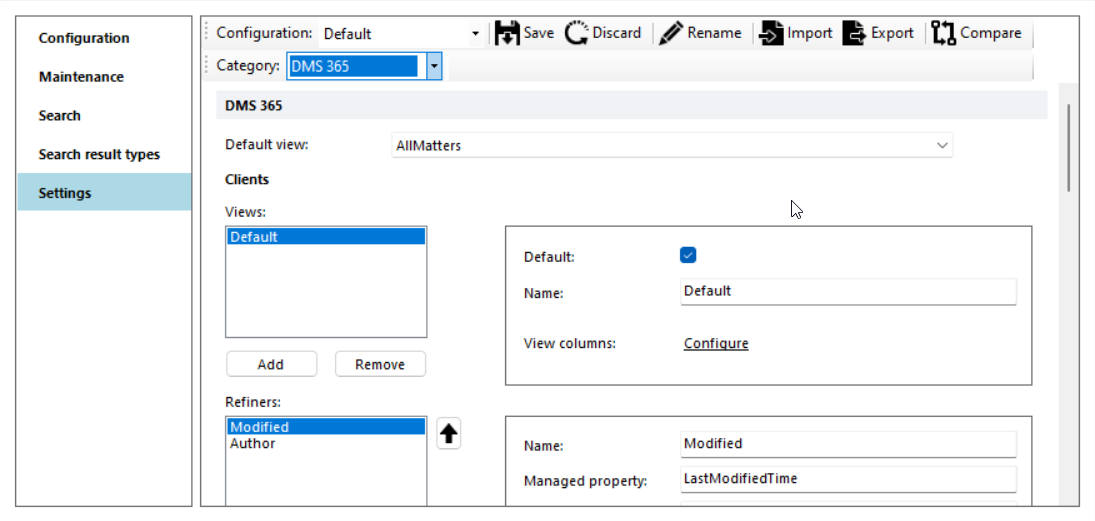
For each panel/view the columns and refiners can be configured. Click on Initialize with default settings to create default settings, that can be modified after they are created.
# Sidebar
The left navigation bar can be configured. Specify max 2 levels. The top level will only be rendered if there are subitems.
Use the localized keys to automatically translate the terms inside the Title and Tooltip.
Currently two types are supported. Based on the url the correct type will be configured.
- list
- iframe
To configure an iframe, specify an URL that will be rendered. If it's a relative url, the current sharepoint url will be automatically added.
To configure a list, use the following format list=view with the fixed view names:
- mydocuments
- recentdocuments
- mymattersdocuments
- favoritedocuments
- mymatters
- recentmatters
- allmatters
- favoritematters
- allclients
- allcontracts.

Icon
Specify the name of the icon. Possible values can be found here (opens new window).
Tooltip
Specify the tooltip
View Sharepoint Group Specify the name of the sharepoint group. If the current user is member of this group, the item will be visible. Use sharepoint groups from the sitecollection where DMSFL is installed.
# Search
The Epona DMS 365 app uses search to show all information from Sharepoint. By default there are no managed properties configured to return additional columns from the Matter List. Open the DMS Configu tool, click on Search and add the missing columns from the Matters List. This will take max 24 hours before the columns are crawled by Sharepoint.
# Caching
The settings for Epona365 are stored in the application storage of the browser. A background process will remove obsolete settings when the settings are too old.
Most of the settings are automatically refreshed after a change. In some cases a duplicate reload of the app (browser) is necessary to have the latest settings. Use the menu option Clear local cache to manually clear the Epona365 cache.
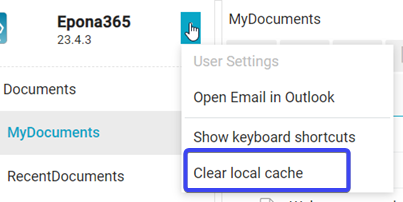
# Columns
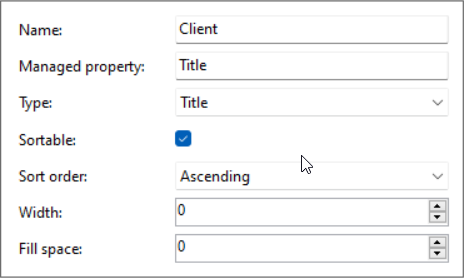
Name
Specify the column labelManaged property
Specify the name of the managed search propertyType
Title => the shortcut icon menu is shown. The column width will always auto-expand
Date => only the date part will be rendered
DateTime => the date value will be rendered with relative labels (like 2 hours ago)
Size => the value will be rendered with relative labels (like 1mb) Teams => a team icon will be rendered if value is true HasAttachment => a paperclip will be rendered if true Importance => an importance icon will be rendered To => rendered value has a fallback to managed property DMSSMTPTo / DMSToSortable
Specify if the property is searchableSort order
Specify the default sort orderWidth
Only specify a value (> 0) if the column should have a fixed widthFill space
Only specif a value (>0) if the columns should use all the available width (expand). If more columns have a value the width is spread over the columns with the relative value. If the first column has a value 1 and the second has a value of 2. The total width is divided by 3 and relatively spread over the two columns as configured.
# Refiners
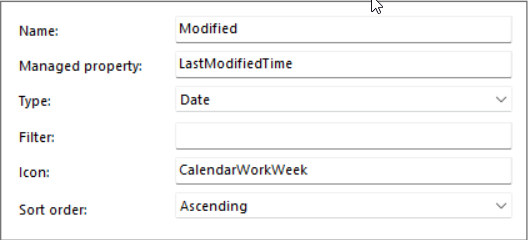
- Name
Specify the refiner label - Managed property
Specify the name of the managed search property - Type
Single select => only one refiner can be selected
Multiple select => one or more refinders can be selected and are used in the search with an OR statement
Date => pre-defined date values can be selected
User => one ore more users can be selected. The items are rendered with an user image based on possible hit on email address - Filter
See the Microsoft Documentation (opens new window) for possible values. - Icon
Specity the name of the icon. Possible values can be found here (opens new window). - Sort order
If a descending order is specified and a filter specified, the sort is descending based on the frequency.
# Clients
Currently one view is supported. Specify which columns and refiners should be visible.
# Matters
Currently one view is supported. Specify which columns and refiners should be visible. If the MatterName column is used in the MatterList, use that field as Title field. Sorting is not possible on the Title field.
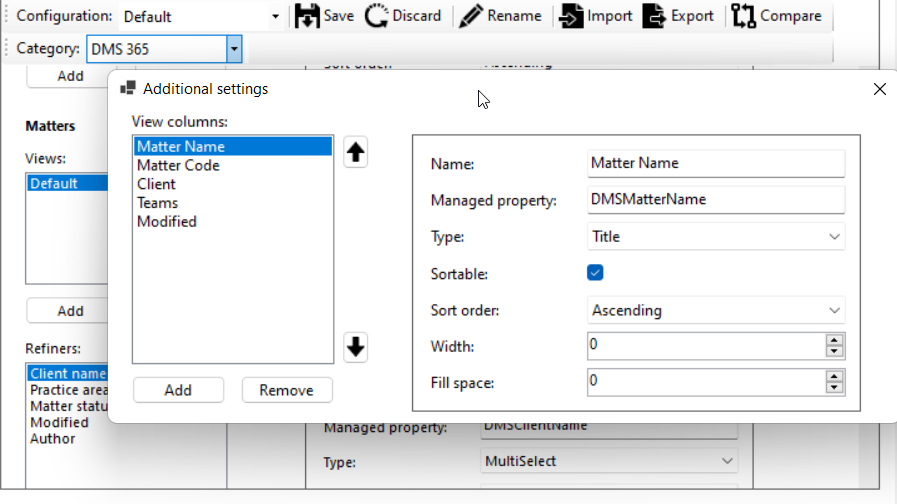
# Content types
When documents are displayed, the view associated with the ‘Default’ content type is shown. If this content type does not exist, the ‘DMS Document’ content type is used as a fallback.
NOTE: Prior to version 25.9.0, the first (topmost) content type was used as the default.
In the Matter view the ClientName and MatterName columns will be automatically removed.
Add a second content type for email named 'DMS Email' to specify the columns and refiners when an email view should be used. The email view is activated based on the foldername, specified in the DMS Config section.
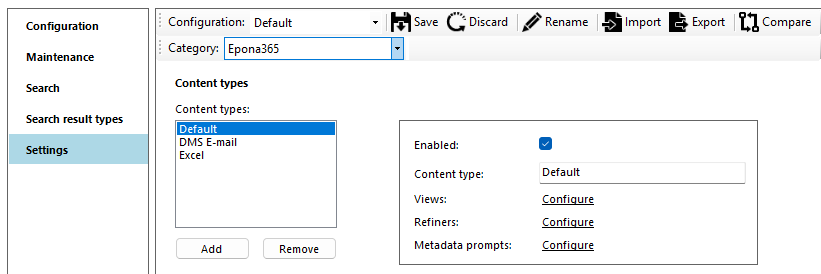
# DMS Config
The following settings that are set via the DMS Config tool are also used in Epona365.
# License
Copy the Client Name and Activation code from the SLM Portal (opens new window) when registering the product DMSfor365 and register/activate the license.
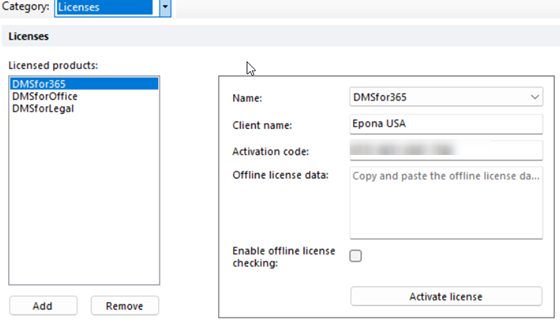
For every user that uses the application a license is automatically registered each time the application is started.
# Outlook
- Create Client/Matter
If enabled, the create client/matter button is visible. If no url is specified, the default URL is used (/Lists/Matters/NewForm.aspx?IsDlg=1)
# Advanced search
- Search sitecollection
If no url is specified, the dmsforlegal sitecollection is used. Make search a subsite Search is available. - Query text addendum
- Maximum Results
# Default ContentTypes
- File extension msg
The content types specified are used for the DMS E-mail view.
# Views
- Folder views
The DMS E-mail view is used when the name of the folder contains one of the specified foldernames.
# Notebooks
The notebooks settings are used in EponaDMS365

# Terms
The Client and Matter terms can be renamed via the DMS Config.
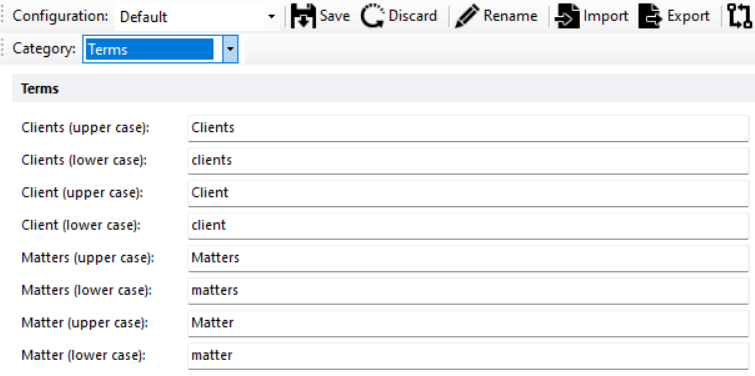
# Contracts
The Contracts module is active in Epona365 if the main Contracts Document library url is specified. Only this model is currently supported. Also specify the name of the content type and configure the columns for that ContentType in the Epona365 contenttype sections

# Epona365 Urischeme extender
The Urischeme extended can be configured via the following settings:
- Disabled, option is not visible in Epona365
- Enabled, option is visible and enabled in Epona365 (the executable should be installed on all machines)
- Available, option is visible, but not enabled by default

# Open PDF Files in Default PDF Application
Required Epona 365 WEB version 25.3.* Required DMS Configurator version 25.0.19.0
Inside DMS configurator go to settings - Category Epona365
Enable: Enable odopen (OneDrive open)
In odopen extensions: add Group name with name "PDF"
In extension add PDF and PDFA extension
